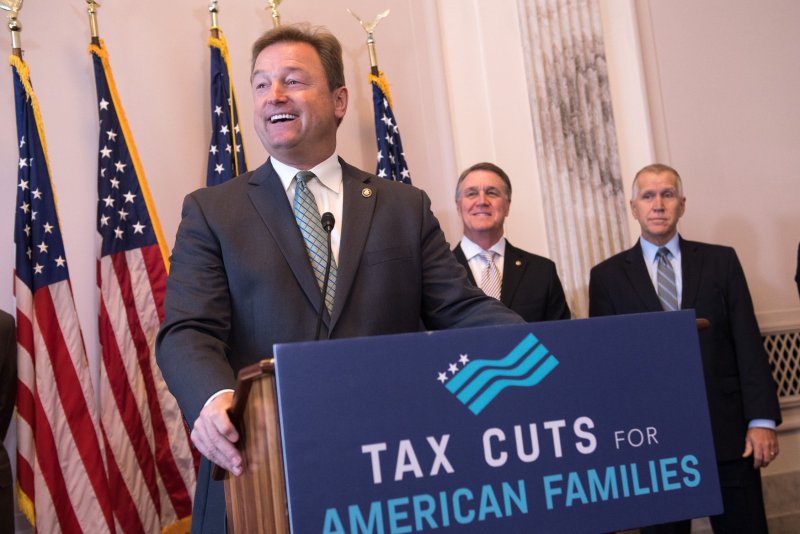Sen. Dean Heller, R-Nev. speaks alongside Sen. David Perdue (C), R-Ga., and Sen. Thom Tillis, R-N.C., at a press conference on the Republican tax plan on Capitol Hill on Wednesday. Photo by Kevin Dietsch/UPI |
License Photo
BRUSSELS, Belgium -- NATO's foreign ministers will assemble in Brussels Tuesday for a major meeting. But poor Rex Tillerson. His counterparts are well aware of his perhaps temporary reprieve from looming professional death by a thousand cuts -- or in this case through stories planted by unnamed White House sources declaring that it is time for this former Boy Scout to saddle up and ride out of town ignominiously.
Think what this does to American credibility with its closest alliance partners and a ministerial that likely will resemble a wake rather than a serious meeting.
This is not the big story from America, however. Nor was former National Security Adviser Michael Flynn's admission of guilt in lying to the FBI the major story. Instead, the Senate's approval of the tax bill early Saturday may be the headline event because it carries the greatest consequences for most Americans.
As with other major legislation, such as the Sarbanes-Oxley Law to cope with corporate wrongdoing; Dodd-Frank that meant to tame the financial services industry; and the Affordable Health Care Act, this bill shares similar characteristics. First, no one read it in its entirety before the Senate vote. Second, even after reconciliation with the House version, the bill will be incomplete and will need further revision and additions. And third, it is most unlikely to accomplish its major purposes.
If Congress and the administration were serious, both would have adhered to basic objectives that tax reform was meant to achieve. First is to promote accelerated economic growth. Second is to raise the wages specifically for less well-off Americans. Third is to produce a more equitable and far less complicated tax structure. Fourth is to reduce the crushing national debt of about $20 trillion. Fifth is to fix our failing infrastructure.
Instead, Republicans followed the low road of political expediency, concluding that passing any legislation trumped passing sound tax reform. But this will not work.
First, key assumptions and promises are that by cutting taxes, the economy will grow at a rate fast enough to offset with new revenues the about $1.5 trillion in projected budget deficits that will accumulate from this bill. And unemployment will be reduced. As a combination of history and reality demonstrates, this is unrealistic.
Tax cuts may produce a short-term increase in economic growth. However this growth has never before been sustained. Unemployment is at record lows of about 4 percent. It is difficult to see how that will be further reduced. Moreover, there are no guarantees that average wages will rise. And runaway non-discretionary spending will produce much more deficit and debt in the future.
The bills assume that interest rates remain low. But what happens when rates climb to a modest 5 percent? With a debt of about $20 trillion, interest payment would soar to about $1 trillion and consume roughly 20 to 25 percent of the federal budget.
If Congress were to reverse course, here are three fixes that would actually achieve the aims noted above. Rather than reduce corporate taxes, make dividends tax deductible.
Currently, double taxation applies. Corporations pay taxes on dividends. Shareholders then are taxed on them. This is unfair.
By making dividends tax deductible, corporations will be encouraged to increase them putting more money in circulation. That money would boast consumption, helping the economy. Or they could be reinvested in other ventures particularly if startups were incentivized with lower tax rates and deductions.
The $2 trillion corporations parked offshore should have been repatriated at minimal penalty provided this money was invested in improving U.S. infrastructure. Long-term bonds, guaranteed by the government, would be issued at 2 percent or so above prime and would be part of a national infrastructure bank. Bonds would be repaid from user and other fees accruing from improvements for roads, bridges, tunnels, ports, highways, Internet, power grid and other vital infrastructure.
Finally, to ensure equity, a maximum individual tax deduction of $150,000-200,000 would be set. This would aid the middle classes and increase the burden on the very well-off who could afford it. And it would simplify the filing of taxes.
Will happen this? No. And if one were a betting person, the safe bet is when this bill becomes law, the most one can hope for is that it does least damage to the public good.
Harlan Ullman has served on the Senior Advisory Group for Supreme Allied Commander Europe (2004-16) and is senior adviser at Washington D.C.'s Atlantic Council, chairman of two private companies and principal author of the doctrine of shock and awe. A former naval person, he commanded a destroyer in the Persian Gulf and led over 150 missions and operations in Vietnam as a Swift Boat skipper. His newest book, "Anatomy of Failure: Why America Has Lost Every War It Starts," is just out. Follow him on Twitter@harlankullman.















